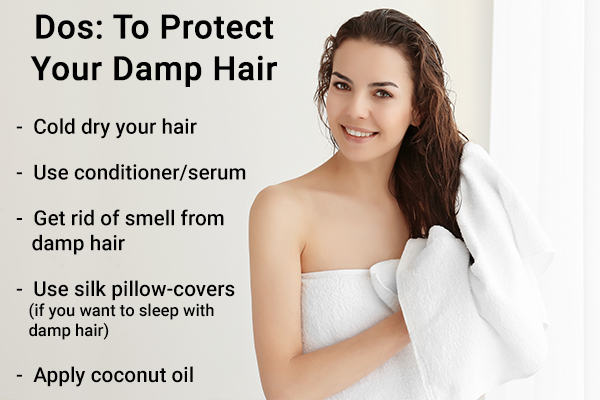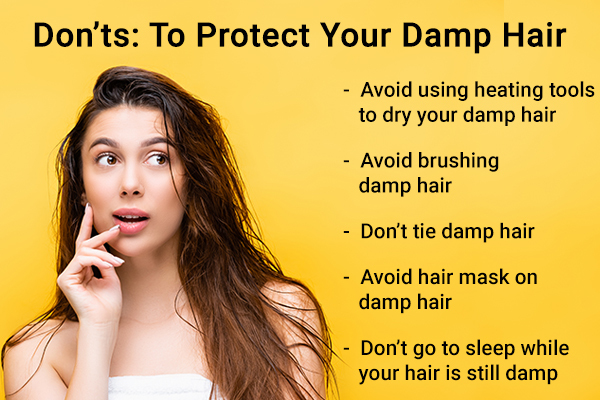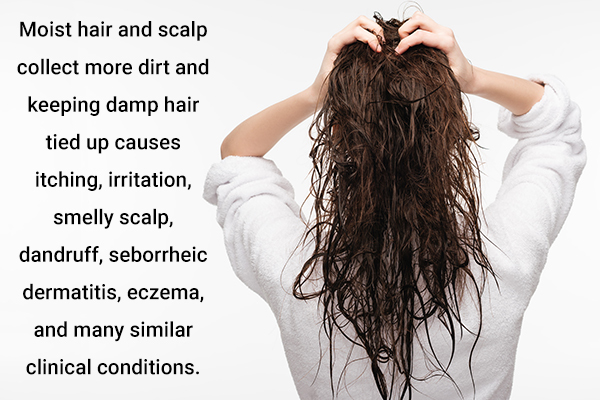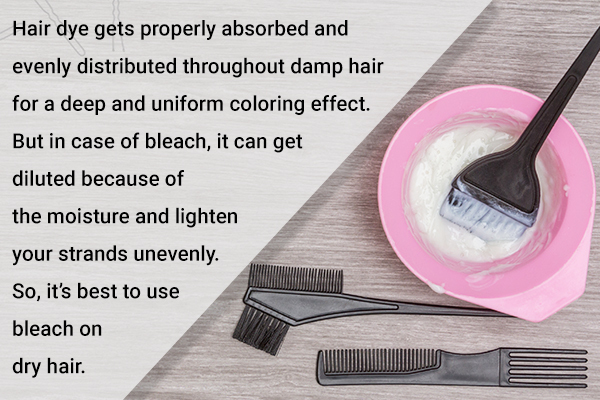In this article:
The kind of hair you are born with depends on your genes, and there is nothing much you can do to change it. However, there are things you can do to protect your hair from undue damage that can worsen its quality and impede its growth.

Your hair is weak when damp or moist and needs to be handled extra carefully. This article will present effective ways to protect your damp hair from undue damage. (1)
Self-Care Measures for Damp Hair
Here are some dos and don’ts to consider when dealing with damp hair:
Dos

1. Cold-dry your hair
After washing your hair, let them air-dry or pat them gently with a soft microfiber towel to soak in the excess moisture. If you are in a hurry, you can go for a cool blow-dry.
This is the correct way to dry your hair rather than regular blow-drying or using a hot iron. (2)
2. Use a conditioner/serum
Applying a conditioner/serum after shampooing your hair will make it soft, smooth, and easily manageable upon drying. These products, when applied on damp hair, help loosen the tangles and knots in your tresses to minimize breakage. (3)
3. Get rid of the smell of damp hair
If your hair remains damp for too long due to water or sweat, it may start to smell bad due to the overgrowth of bacteria. You can avoid this by using a mild but pleasant-smelling shampoo with antibacterial compounds that can help cleanse the scalp and hair while also adding a nice fragrance to them. (4)
4. Use silk pillow covers
If you are planning to go to bed while your hair is still damp, make sure to place a silk pillow cover under your head. Silk is soft and nonabsorbent, which means it won’t rub harshly against your brittle hair nor will it strip away its moisture. (5)
5. Apply coconut oil
The pores of your hair open up when they are damp, allowing better product absorption. So, after you wash your hair, apply coconut oil while they are still damp.
Coconut oil will provide deep nourishment and conditioning to your hair, while also preventing microbial growth due to its antimicrobial property. (6)
Don’ts

1. Avoid using heating tools to dry damp hair
Using a blow-dryer or heating iron to dry your hair will strip away its natural lipids along with the excess moisture, leaving it utterly dry, rough, and frizzy. (7)
Plus, exposure to high heat also burns the cuticle (the outermost covering of the hair strand), which protects the sensitive hair matrix inside. This erosion of the cuticle can open your hair to more long-lasting damage and destruction of its basic structure.
2. Avoid brushing damp hair
Water penetrates the strands to form hydrogen bonds that are loose and render your hair weak. Dry hair, on the other hand, contains protein-protein bonds that are more intact.
Brushing or combing your brittle moist hair will exert force that will break the strands or make them fall out of the follicle. (8) Hence, it is better if you brush your hair after they are completely dry and use a hair serum to make the hair frizz-free.
3. Don’t tie damp hair
Tying up your hair while it is still damp can lead to breakage since moisture makes it extra brittle.
Moreover, tying up damp hair will prevent proper air ventilation, which means the dampness will persist for longer. Due to the lack of air and excess moisture, your scalp can become a breeding ground for microbes, leading to scalp infections. (9) The prolonged dampness can even trigger a headache.
4. Avoid applying hair masks on damp hair
Experts recommend applying hair masks to wet hair rather than to damp hair. The pores of hair strands open when they are moist, allowing for swift absorption of the ingredients. But when used on wet hair, the mask also seals in water for deep conditioning.
Thus, hair masks deliver better results and more intensive hair conditioning when applied to wet hair rather than damp hair. (8)
5. Don’t go to sleep with damp hair
Hair is weak when damp, so when you sleep with damp hair, the hair strands will bend and rub against the pillow, which can lead to unnecessary breakage or hair fall.
Additionally, the hair will get pressed beneath your head and take longer to dry due to lack of air. Prolonged dampness can lead to microbial overgrowth on the scalp, resulting in bad odor, itching, irritation, and infection. Plus, sleeping with damp hair can trigger sinusitis and headaches. (10)
What Problems Are Associated With Damp Hair?

Your hair becomes damp due to two conditions: a head bath and scalp sweating. Dampness essentially means that your hair is slightly moist, rather than completely wet with water dripping from it.
Here are some problems associated with damp hair:
- This moisture renders your hair structurally fragile and prone to breakage even at the slightest of force.
- If your hair remains damp for too long, it creates a favorable environment for the overgrowth of bacteria and fungus that can trigger scalp infections.
- Moist hair and scalp collect more dirt.
- Keeping damp hair tied up causes itching, irritation, smelly scalp, dandruff, seborrheic dermatitis, eczema, (9) and many similar clinical conditions.
- Hair tends to become tangled and even knotted when it dries after being damp for a long time.
- Prolonged exposure to moisture can make your hair extra frizzy.
Is It ok to Apply Dye or Bleach to Damp Hair?

Damp hair has open pores that allow hair products to penetrate easily and deeply into the strand. This may be a good thing when using a dye, but not so much in the case of hair bleaching.
To elaborate, the dye will get properly absorbed and evenly distributed throughout the hair strand for a deep and uniform color. (11) But when bleach is applied to your damp hair, it will get diluted because of the moisture and will lighten your strands unevenly. (12) So, it’s best to use bleach on dry hair.
Final Word
Hair care should be an integral part of your beauty regimen as the quality of your tresses has a significant impact on your overall appearance. However, not everyone has the same type of hair, which is why there couldn’t be a single standardized hair care regimen that suits everyone.
You should plan your hair care practices and choose your hair care products according to your hair type and needs. However, some basic hair care tips, like the ones mentioned in this article, apply to all types of hair.
Damp hair is extremely brittle, which makes it more prone to damage and breakage. Plus, if it remains damp for too long, your hair and scalp can become breeding grounds for infection-causing microbes. Thus, it is very important to tend to your hair properly, especially when it is damp.
Negligent hair care can progressively damage your hair quality to a point where it may become impossible to repair.
- Was this article helpful?
- YES, THANKS!NOT REALLY


